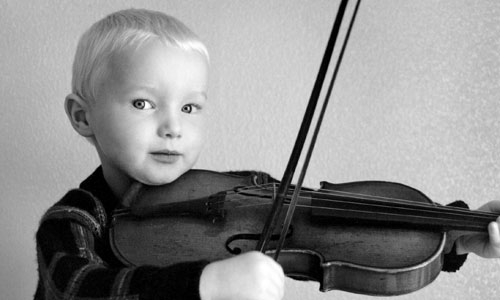Parents and Music Lessons: Surviving Practice by Ellen Kogut
/ October 1, 2015
Version française...

Practice is necessary for success on a musical instrument, but many parents struggle to make it part of their children’s routine. Implementing the following changes can help students get the most out of their practice.
Be involved
Know what scales and exercises your child has been assigned, and what sections of repertoire need the most attention each week. Be in charge of initiating practice and making sure that your child is working towards specific goals, not just playing through pieces.
Be patient
Practice is a skill that must be nurtured and developed. Be willing to sit down with your child and patiently walk him or her through the steps of practicing correctly. This is how your child will learn to practice independently later on.
Commit to a little everyday
Start thinking of practice as a routine rather than a big event. Keep your child’s instrument easily accessible in the home and set a time limit for practices, even if it is modest. A student can accomplish a lot in just a few minutes if they focus on a specific goal.
Consider the morning
Many children are tired and distracted at the end of the day. For them, ten minutes of morning practice could accomplish the same as twenty minutes of practice after school. Practicing early also leaves the afternoon free for homework, play, and other extra-curricular activities.
Listen at home
To supplement practice, play professional recordings of your child’s pieces at home. Listening helps children internalize notes and rhythms, as well as more sophisticated phrasing and stylistic ideas.
Have a plan for the difficult days
One of the reasons we value music lessons is that they help us develop the skills we need to overcome challenges. If you sense your child is about to break down during a practice session, let them take a break before things get out of hand. Allow your child to go to the washroom, get a drink of water, or walk around the room. Then try to break the problem down into small steps. Can they achieve the first step, even if they can’t solve the whole problem? If they are really stuck, they can devote their practice time to reviewing old pieces and on improving tone production – this type of work is always worthwhile. Make sure your child asks their teacher for help at the next lesson.
Have fun!
Measure your child’s progress using charts and calendars. Change up your routine by practicing outside on a nice day. Or try having your child “teach” you how to play a piece. Use your creativity to make practice interesting and engaging whenever possible.
Rewards
Giving rewards for music lessons and performances is a balancing act. Parents want to celebrate their children's’ accomplishments and motivate them to progress further, but they also know that motivation should come from music itself. The following ideas can help parents develop an approach that works best for their children:
Detailed Praise
Specific praise like, “Your tone was so resonant during the performance,” or “You played that difficult rhythm very precisely at today’s lesson,” can be very meaningful to children. This type of feedback communicates that you value quality music making, and that you are supportive of your child’s development as a budding artist.
Family time
Children often take pride in earning something for others to enjoy. As a reward for a week of good practice, go on a family outing to the park, library, or farmers’ market. Other ideas include cooking a special family meal, or letting your child choose a game for the family to play together.
Progress charts
Use small prizes like stickers or stamps to keep track of practice days. Children often get excited about adding more to their chart each week. You can also collect small objects, like popcorn kernels, in a jar every time your child practices a certain passage. By the time the jar is full, playing has improved considerably and everyone can eat the popcorn. Here, the focus is on the completion of a big goal involving multiple steps.
Modest material rewards
Stickers and small pieces of candy can provide good short-term motivation. Aim to keep these types of rewards modest and infrequent so that they do not overshadow the focus on music. Save larger gifts, like toys and sums of cash, for birthdays and holidays.
Concert tickets or recordings
If you feel that a bigger gift is in order for your child, perhaps for a special performance, consider giving concert tickets or recordings. Hundreds of classical and jazz concerts take place in Montreal each month, and many ensembles offer family programs that appeal to young children. Recordings are also a wonderful gift option, as they can open up a world of musical exploration and appreciation for your child. Ask your teacher to recommend artists and composers.
Version française... | 
